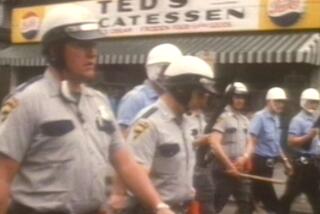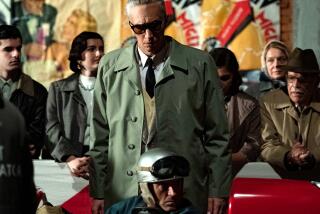TV REVIEW : ‘FORD’: A QUICK START . . . AND A SMOOTH RUN
- Share via
The two-part miniseries “Ford: The Man and the Machine” starts right up and gives good dramatic mileage (with part 1 airing tonight at 8 on Channel 13).
After just six minutes, viewers who’ve never driven an American car already know that in 1927, Henry Ford (Cliff Robertson) is an extremely rich and crudely powerful anti-Semite who’s apparently not running on all of his cylinders.
It’s also clear that Ford’s right-hand man Harry Bennett (Michael Ironside) is a sinister thug and that Ford’s only son Edsel (R.H. Thomson) should have been named after the car, not vice versa.
Henry Ford was a complex, paradoxical man. His public life was peppered with controversy and his private life, which is what is emphasized in “Ford,” was a mess. A Populist who hated bankers and war and believed in reincarnation, he became a super industrialist by making cars for the masses. He loved the working man and championed the rights of minorities, yet hated unions and suppressed them ruthlessly.
The four-hour docudrama, which concludes next Tuesday at 8 p.m., is sometimes short on historical perspective and unclear when covering Ford’s autocratic, business wheelings and dealings. But the engrossing story is richly detailed, never lags and the period look (ironically, filmed in Montreal) and acting are generally top-notch.
Robertson, who ages smoothly as Ford from 39 to his death in 1947 at 84, is excellent as the manipulative eccentric whose intuitive genius “changed the world.” So are Hope Lange, the ever-faithful wife Clara who learns to live with Ford’s anachronistically sex-kittenish mistress (played by Heather Thomas), and, particularly, Thomson, the never sufficiently loved and relentlessly humiliated Edsel who’s reduced to a sniveling mess by his all-powerful father.
“Ford: The Man and the Machine,” which is based on Robert Lacey’s best-selling biography of the same name, is based on fact, and some characters and events have been fictionalized for dramatic effect.
That, as is usual with docudramas, leaves viewers somewhat confused about the ultimate veracity of what they’re seeing. Truth-seekers should read Lacey’s book or maybe just contemplate whether Henry Ford’s own words apply: “History as is sometimes written is bunk. But history that you see is of great value.”
More to Read
The complete guide to home viewing
Get Screen Gab for everything about the TV shows and streaming movies everyone’s talking about.
You may occasionally receive promotional content from the Los Angeles Times.






